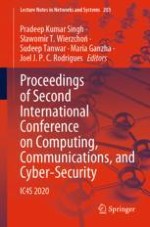2021 | OriginalPaper | Chapter
The Sentimental Analysis of Social Media Data: A Survey
Authors : Vartika Bhadana, Hitendra Garg
Published in: Proceedings of Second International Conference on Computing, Communications, and Cyber-Security
Publisher: Springer Singapore
Activate our intelligent search to find suitable subject content or patents.
Select sections of text to find matching patents with Artificial Intelligence. powered by
Select sections of text to find additional relevant content using AI-assisted search. powered by
